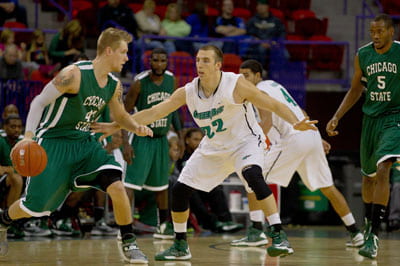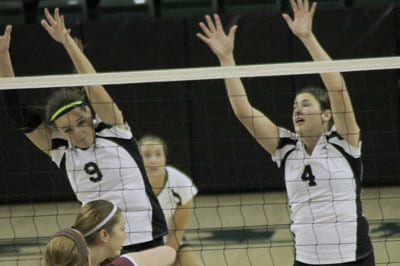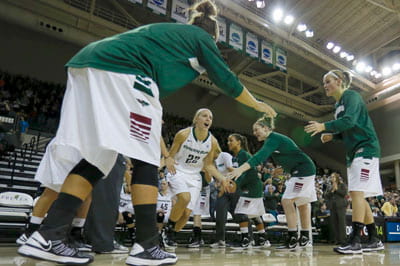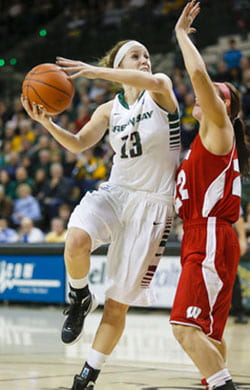 The academic success of UW-Green Bay’s student-athletes is no coincidence.
The academic success of UW-Green Bay’s student-athletes is no coincidence.
According to the program’s academic coordinator, Mike Kline, the student-athletes’ success comes from coaches recruiting those with strong academic backgrounds and providing these students with the resources they need to be successful.
Last May marked the twenty-fifth consecutive semester that UW-Green Bay’s cumulative student-athlete GPA was at least a 3.0. And recently UW-Green Bay was recognized for this accomplishment by “The Best Colleges” website (www.thebestcolleges.org), alongside Baylor University, University of Central Florida, and others, as one of the top “11 colleges with the smartest athletes.” The article also noted the UW-Green Bay’s women’s basketball team’s accomplishment of having 31 consecutive semesters with a GPA greater than 3.0.
Phoenix Athletics regularly reminds student-athletes to make a priority of academics, and the program steers players to make use of resources including study tables, tutoring, and frequent communication with faculty and staff.
“We have study table three nights for two and a half hours each night that is mandatory for all freshmen. It is required for all other student-athletes until they maintain a certain GPA,” Kline says.
“We want our student-athletes to understand that their academics and their education is their top priority,” he adds. “They are student-athletes, and if ‘student’ comes before ‘athlete,’ it follows that academics should come before athletics. They complement each other, and if you are willing to be your best in one then you will take pride in being your best in both.”
Tim Meyer, professor emeritus of Information and Computing Sciences/ Communication, believes UW-Green Bay has a “culture of academic success [that] is part of the entire program of intercollegiate athletics that spans all men’s and women’s sports.”
Meyer adds that many of the athletes study “challenging and demanding” majors and minors.
He credits on-campus support including Academic Advising, Admissions and the Registrar, faculty, staff and instructors for making expectations clear. He says communication between student-athletes and instructors plays a major part in being successful. He also notes that faculty and staff do not give “unwarranted breaks” to the student-athletes.

Lyndsay Zabkowicz, a junior majoring in Human Biology with an emphasis in exercise science, is on UW-Green Bay’s women’s volleyball team. She says setting a schedule and sticking to it has helped her maintain a strong academic record.
“We do not get much down time so we really have to use our time well,” she said.
She also mentions that coaches and staff are very helpful in making sure student-athletes have all the tools they need to succeed.
Don McCartney, senior lecturer of Business Administration, said that during a mandatory presentation time for his classes, student-athletes have used Skype to ensure they can comply with giving the presentation at the required time, even when on the road for competition.

Monica Anderson, a junior majoring in Democracy and Justice Studies, is also on the women’s volleyball team. Like Zabkowicz, she says setting a schedule for study time is important. She mentions that the study table participation required of freshmen is beneficial throughout their entire college career.

Lydia Bauer, a senior majoring in Business Administration with an emphasis in marketing, is on the women’s basketball team. She believes time management, as well as communicating with her professors, have helped her most in managing academics and athletics.
“As a team we stress the importance of our education and want to maintain a good reputation with the professors of the University,” Bauer said. “The athletic department also provides wonderful resources for all the student-athletes to use in order to succeed.”
Meyer believes that some of the academic success can be attributed to the sense of camaraderie exhibited among team members.
“They help each other out. Most of it, of course, goes on quietly behind the scenes but the hard evidence emerges at the end of every semester,” Meyer said.
 Phoenix basketball player Daniel Turner, a junior Business Administration major with an emphasis in management and a minor in Economics, says he prioritizes his activities to get them done before deadlines.
Phoenix basketball player Daniel Turner, a junior Business Administration major with an emphasis in management and a minor in Economics, says he prioritizes his activities to get them done before deadlines.
“A couple of the biggest challenges I face are trying to allocate enough time for each class as well as missing class due to travel,” he said. “The University does a good job of providing help, such as tutors, to help me learn the material I have missed due to travel.”
“It’s not unusual to find them studying on road trips while traveling via plane or bus,” added Donna Ritch, associate dean of Liberal Arts and Sciences.
 Adrian Ritchie, a senior majoring in Business Administration with an emphasis in marketing and a minor in Communication, plays women’s basketball.
Adrian Ritchie, a senior majoring in Business Administration with an emphasis in marketing and a minor in Communication, plays women’s basketball.
Juggling both academics and athletics feels natural for her.
“We are lucky to be part of a university that has such strong support for our program and makes it possible to obtain our goals despite any obstacles or challenges we may have,” Ritchie said.
Ritchie said meeting expectations and upholding the standard of academic and athletic success is the “Green Bay Way.”
“The University is full of people who work hard so it is a better place for everyone,” she added.
Academic excellence will be recognized on Academic Achievement Night, February 7, when the men’s basketball team hosts Wright State at the Resch at 7 p.m. A special program listing all faculty and staff will be distributed as fans enter the Resch Center. Faculty and staff can receive two free tickets to the game by following this link.
— Story by Michael Duenkel, editorial intern, Marketing and University Communication

